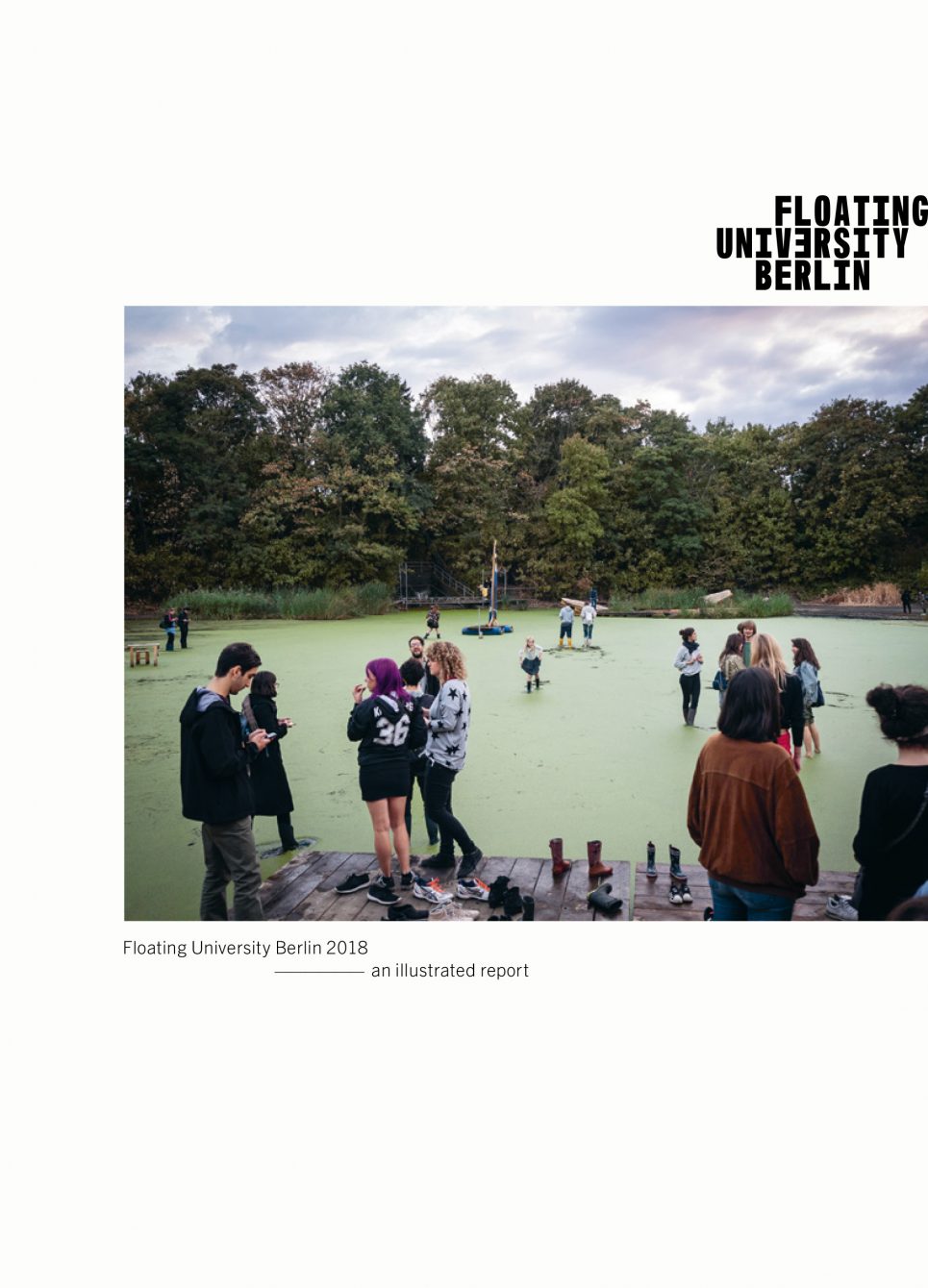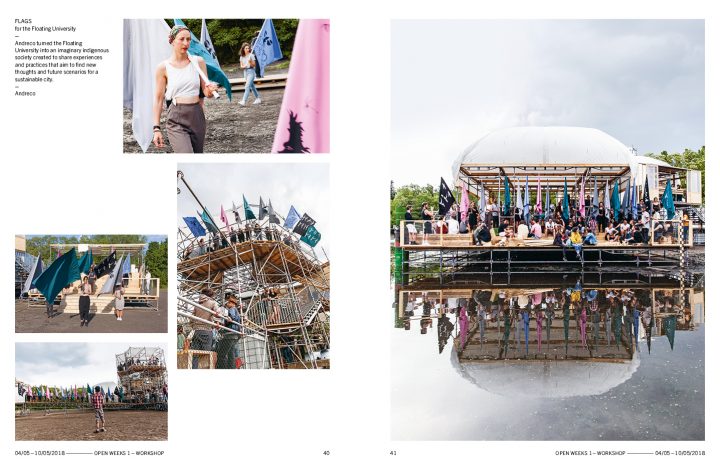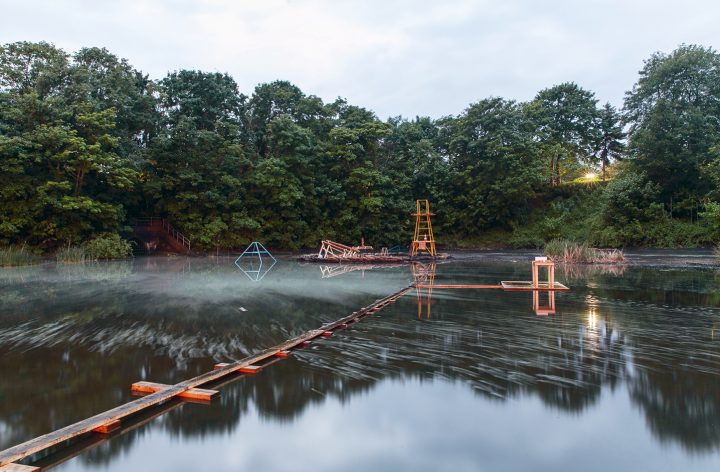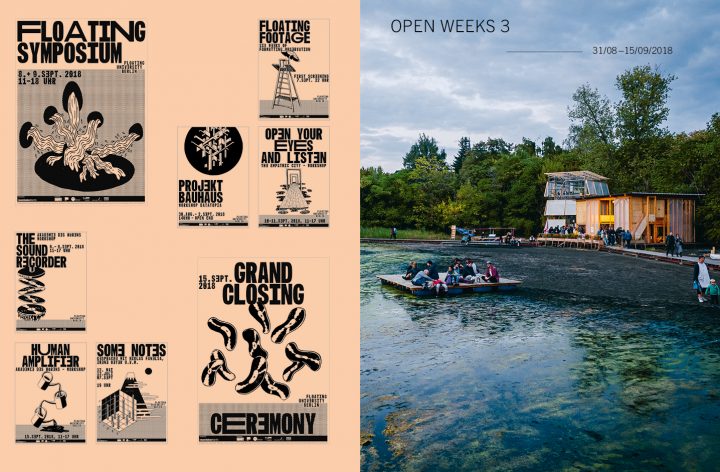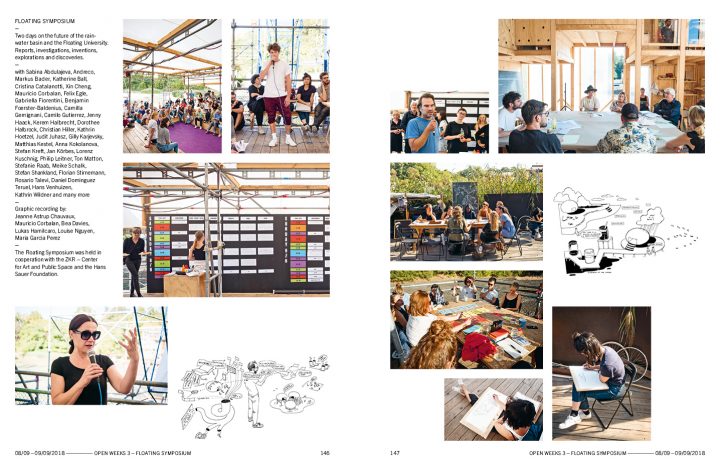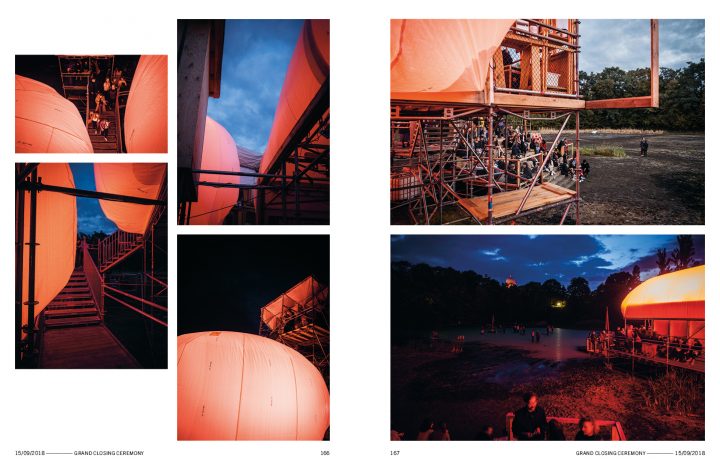Floating University Berlin 2018 – an illustrated report
Edited by: raumlaborberlin, Florian Stirnemann, Benjamin Foerster-Baldenius
Proofreading: Anna Foerster-Baldenius
Graphic Design: Lena Appenzeller
Picture Editing: Florian Stirnemann
Image Processing: Günther Piltz
Printproduction: Medialis Osetdruck GmbH, Berlin
Price: 22€
Pages: 176
Language: English
Publisher: raumlaborberlin
to get a book write to info@raumlabor-berlin.de
We are proud and exited to announce our new book: Floating University Berlin 2018 – an illustrated report
It is a chronological reflection, in pictures, of the first year of the Floating University. In it we tell the initial story of our visionary inner city offshore-laboratory for collective, experimental learning, knowledge transfer and the formation of trans-disciplinary networks to challenge the routines and habits of urban practices.
Cover picture ©Daniel Seiffert
The summer of 2018 was a very hot and very dry, a glimpse of Berlin summers to come. Conversely, the place that forms the subject of this book was created exclusively for very wet days. Through this coincidence the rainwater retention basin of the former Tempelhof Airport became an arid wasteland, and as such the perfect location for the Floating University Berlin – an offshore campus for cities in transformation. The heavenly, contaminated concrete pool of muddy water with its rich variety of plants, birds, amphibians and insects is a magic display of the Anthropocene. For 6 months it became the meeting place for students and experts of the culture of the city, with everyone wondering how to synchronize our everyday lives to the rapid changes urbanity is undergoing at the moment. A true place of transdisciplinary exchange grew with more than 20 seminar groups, 47 workshops, and numerous discussions, presentations and lectures. A laboratory and a platform for new forms of urban practice emerged, quickly outgrowing its expectations.
Der Sommer 2018 war ein sehr heißer und sehr trockener Sommer, der erste dieser Art in Berlin. Der Ort, um den es in diesem Buch geht wurde dagegen ausschließlich für sehr feuchte Tage gebaut. Dadurch wurde das Regenwasserrückhaltebecken des ehemaligen Flughafen Tempelhof in Berlin zur einer wetterbedingten Brachlandschaft. Und der Standort der Floating University Berlin zu einem Offshore Campus für Städte in Transformation. Das paradiesische, kontaminierte Matschbecken mit seiner reichen Vegetation, seinen Vögeln, Amphibien und Insekten wurde 6 Monate zum Treffpunkt für Studierende und wissensdurstige Menschen mit Experten der Stadtkultur. Gemeinsam experimentierten sie an neuen Formen der urbanen Praxis. In über 20 Seminargruppen, in 47 Workshops und unzähligen Diskussionen, Präsentation und Vorträgen entstand ein Ort des transdisziplinären Austausches, der weit über seine Erwartungen herauswuchs.
Photographs contributed by: Pierre Adenis, Katherine Ball, Jack Bardwell, Irene Beyer, Samuel Boche, Beatrice Davies, Irene Rojas Erlenbach – Wildschnitt, FLAR – Kaśka Jankiewicz & Mila Łapko, Thilo Folkerts, Lena Giovanazzi, Jan Kampshoff, Matthias Kestel, Ivana Kličković, Jan Korbes, Tanja Lindner – Projekt Bauhaus, Lilia Luganskaia – Perennial Institute, raumlaborberlin, Daniel Seiffert, Alexander Stumm, Victoria Tomaschko, Hans Venhuizen, Benoȋt Verjat
With contributions from/Mit Beiträgen von: Joeanne Pouzenc, Gilly Karjevsky, Benjamin Foerster-Baldenius
If you want to purchase Floating University Berlin 2018 / Wenn Sie Floating University 2018 bestellen wollen send an e-mail to: info@raumlabor-berlin.de
Or if you’re in Berlin, you can buy the book at Zabriskie, pro qm, books people places and ebertundweber
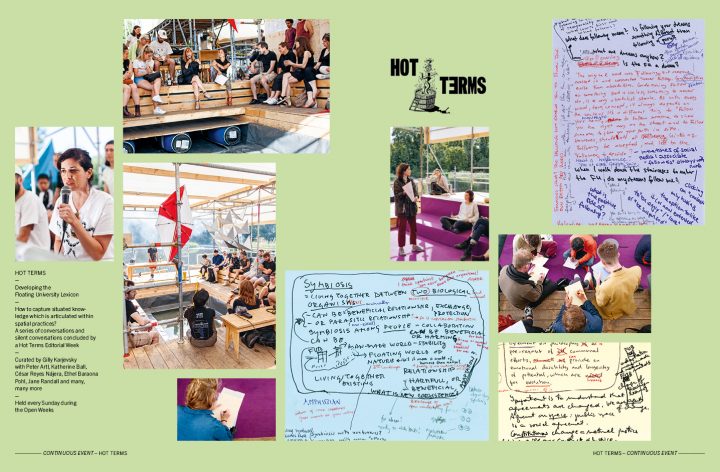 © Viktoria Tomaschko, Lena Giovanazzi, Tanja Lindner (Projekt Bauhaus)
© Viktoria Tomaschko, Lena Giovanazzi, Tanja Lindner (Projekt Bauhaus)
REALIZED IN COOPERATION WITH Weißensee Kunsthochschule Berlin, Berliner Wasserbetriebe, FG Entwerfen und Gebäudeplanung UdK Berlin, Flussbad Berlin, Hallo Festspiele, Hans Sauer Stiftung, Jugendtheater Werkstatt Spandau, Kompetenzzentrum Wasser Berlin, Making Futures Bauhaus+, Open Raumlabor University / Urban School Ruhr projekt bauhaus, Soundance Festival, Tempelhof Projekt GmbH, TU Berlin – Habitat Unit, ZKR – Zentrum für Kunst und öffentlichen Raum
STUDENTS FROM THE FOLLOWING UNIVERSITIES TU Berlin, UdK Berlin, Universität Witten / Herdecke, KHM Köln, TU München, Universidad La Gran Colombia Bogotá, Bergen School of Architecture, HfG Karlsruhe, ENSA Nantes, Design Academy Eindhoven, Weißensee Kunsthochschule Berlin, Royal Academy of Art The Hague, TH Nürnberg, Ecal Lausanne, HNE Eberswalde, HfbK Hamburg, Kunstuniversität Linz, Ensa Toulouse
FUNDED BY The Bauhaus heute Fund of the Federal Cultural Foundation, Berliner Wasserbetriebe, Bundeszentrale für politische Bildung, Hans Sauer Foundation, Kultursstiftung des Bundes, Rudolf Augstein Stiftung, Senatsverwaltung für Kultur und Europa, Tisch Gerüstbau Gmbh, Zentrum für Kunst und Öffentlichen Raum – Grün Berlin GmbH
As of 2019 the space is no longer called The Floating University Berlin, following the Berliner Hochschulgesetz which states that only proper universities may use the word. Currently we go under Floating University until we find a new name.
